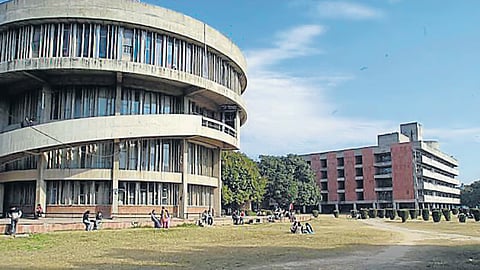

The ongoing controversy over the dissolution of the Panjab University (PU) Senate has triggered an uproar on campus and across Punjab’s political circles. Students, teachers and the political parties including Congress and the AAP have been protesting what they call an “attack on university democracy,” while the Centre maintains that the decision is part of much-needed reforms.
Last week, the Ministry of Education issued a Gazette notification announcing the dissolution of the university’s existing Senate and Syndicate. These two elected bodies have traditionally been the backbone of PU’s decision-making, dealing with everything from academic policies to financial approvals. The new order replaces the large, elected Senate -earlier having around 90 members - with a smaller body of mainly nominated members.
According to the Centre, the restructuring is being done under the Punjab Reorganisation Act, 1966, and aligns with the National Education Policy (NEP) 2020, which recommends administrative streamlining in higher education institutions. Officials argue that the old structure was outdated and slow in decision-making, while the new system will make governance more efficient.
However, the move has not gone down well on the campus or in the state. Students and teachers say that the change effectively ends the tradition of elections that allowed graduates and faculty to choose their representatives in the Senate. “It’s a blow to democratic participation. The Senate was one place where alumni and teachers could raise genuine issues,” said a member of a students’ union protesting outside the Vice-Chancellor’s office.
Political parties in Punjab have also jumped into the debate, calling the Centre’s move an attempt to centralise control over a historically significant university that has deep roots in the state’s identity. The Punjab government has hinted at exploring legal options, arguing that the university’s character should not be changed without consultation with the state.
The protests on campus have intensified in recent days. On Monday, students blocked Gate No. 2 of the university for several hours, shouting slogans and demanding that the decision be rolled back. The protest also linked with another ongoing issue - students being asked to sign affidavits restricting their right to protest. This has further fuelled anger, with protesters alleging that the administration is trying to silence dissent.
Teachers’ associations have called the Senate’s dissolution “undemocratic” and warned that it will reduce accountability in how the university is run. “The Senate acted as a check on arbitrary decisions. By turning it into a nominated body, that safeguard is gone,” said a senior professor.
Educationists say the changes could have far-reaching consequences. The biggest impact will be on representation: thousands of graduates who used to vote in the Senate elections will lose that right. The decision-making power will now shift towards a smaller group of officials and nominees, which may lead to faster decisions but fewer debates.
As per information, student unions at PU have announced another round of protests for Tuesday afternoon. They have stated that the agitation will continue until the Centre withdraws the notification or initiates consultations with stakeholders. More student groups are expected to join the march, and police deployment on the campus is likely to be increased to prevent any disruption.